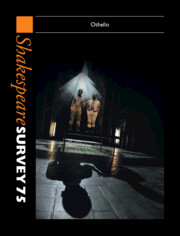Book contents
- Shakespeare Survey 75
- Shakespeare Survey
- Shakespeare Survey
- Copyright page
- Editor’s Note
- Contributors
- Contents
- Illustrations
- Understanding Iago, An Italian Film Adaptation Of Othello: Clientelism, Corruption, Politics
- Circumventing Marginality: The Curious Case Of India’s Othello Screen Adaptations
- Othello’s Kin: Legacy, Belonging And The Fortunes Of The Moor
- ‘More Fair Than Black’: Othellos On British Radio
- ‘This Fair Paper’: Othello And The Artists’ Book
- Othello: A Dialogue With The Built Environment
- ‘[A] Maid Called Barbary’: Othello, Moorish Maidservants And The Black Presence In Early Modern England
- ‘The Moor’s Abused By Some Most Villainous Knave, Some Base Notorious Knave, Some Scurvy Fellow’: Legal Spaces, Racial Trauma And Shakespeare’s The Tragedy Of Othello, The Moor Of Venice
- Ben Jonson’s Sejanus And Shakespeare’s Othello: Two Plays Performed By The King’s Men In 1603
- Iago And The Clown: Disassembling The Vice In Othello
- Pitying Desdemona In Folio Othello: Race, Gender And The Willow Song
- Desdemona’s Honest Friend
- Suffering Ecstasy: Othello And The Drama Of Displacement
- Othello’s Sympathies: Emotion, Agency And Identification
- Warning The Stage: Shakespeare’s Mid-Scene Entrance Conventions
- Looking For Perdita In Ali Smith’s Summer
- Grafted To The Moor: Anglo-Spanish Dynastic Marriage And Miscegenated Whiteness In The Winter’s Tale
- Rhyme, History And Memory In A Mirror For Magistrates And Henry VI
- ‘Bad’ Love Lyrics And Poetic Hypocrisy From Gascoigne To Benson’s Shakespeare
- Viola’s Telemachy
- New Analogical Evidence For Cymbeline’s Folkloric Composition In The Medieval Icelandic Ála Flekks Saga
- ‘But When Extremities Speak’: Harley Granville-Barker, Coriolanus, The World Wars And The State Of Exception
- Shakespeare Performances in England, 2021
- Shakespeare Performances in England, 2021
- Professional Shakespeare Productions In The British Isles, January–December 2020
- The Year’s Contribution To Shakespeare Studies
- Abstracts Of Articles In Shakespeare Survey 75
- Index
Othello’s Kin: Legacy, Belonging And The Fortunes Of The Moor
Published online by Cambridge University Press: 24 August 2022
- Shakespeare Survey 75
- Shakespeare Survey
- Shakespeare Survey
- Copyright page
- Editor’s Note
- Contributors
- Contents
- Illustrations
- Understanding Iago, An Italian Film Adaptation Of Othello: Clientelism, Corruption, Politics
- Circumventing Marginality: The Curious Case Of India’s Othello Screen Adaptations
- Othello’s Kin: Legacy, Belonging And The Fortunes Of The Moor
- ‘More Fair Than Black’: Othellos On British Radio
- ‘This Fair Paper’: Othello And The Artists’ Book
- Othello: A Dialogue With The Built Environment
- ‘[A] Maid Called Barbary’: Othello, Moorish Maidservants And The Black Presence In Early Modern England
- ‘The Moor’s Abused By Some Most Villainous Knave, Some Base Notorious Knave, Some Scurvy Fellow’: Legal Spaces, Racial Trauma And Shakespeare’s The Tragedy Of Othello, The Moor Of Venice
- Ben Jonson’s Sejanus And Shakespeare’s Othello: Two Plays Performed By The King’s Men In 1603
- Iago And The Clown: Disassembling The Vice In Othello
- Pitying Desdemona In Folio Othello: Race, Gender And The Willow Song
- Desdemona’s Honest Friend
- Suffering Ecstasy: Othello And The Drama Of Displacement
- Othello’s Sympathies: Emotion, Agency And Identification
- Warning The Stage: Shakespeare’s Mid-Scene Entrance Conventions
- Looking For Perdita In Ali Smith’s Summer
- Grafted To The Moor: Anglo-Spanish Dynastic Marriage And Miscegenated Whiteness In The Winter’s Tale
- Rhyme, History And Memory In A Mirror For Magistrates And Henry VI
- ‘Bad’ Love Lyrics And Poetic Hypocrisy From Gascoigne To Benson’s Shakespeare
- Viola’s Telemachy
- New Analogical Evidence For Cymbeline’s Folkloric Composition In The Medieval Icelandic Ála Flekks Saga
- ‘But When Extremities Speak’: Harley Granville-Barker, Coriolanus, The World Wars And The State Of Exception
- Shakespeare Performances in England, 2021
- Shakespeare Performances in England, 2021
- Professional Shakespeare Productions In The British Isles, January–December 2020
- The Year’s Contribution To Shakespeare Studies
- Abstracts Of Articles In Shakespeare Survey 75
- Index
Summary
Among the countless events commemorating the 400th anniversary of Shakespeare’s death in 2016 was a remarkable staged reading at Emory University of the two-act drama Fortunes of the Moor, which was written and directed by the late Barbara Molette (1940–2017) and her husband Carlton Molette (born 1939), whose collaborations have earned them many accolades, including the National Black Theatre Festival’s ‘Living Legend’ Award. Fortunes takes its title from the last speech in Othello when Desdemona’s cousin Lodovico urges their uncle Graziano to lay claim to Othello’s worldly possessions, to ‘seize upon the fortunes of the Moor’ (5.2.376).2 However, the Molettes’ play proposes that the ‘fortunes’ sought by Desdemona’s relatives belong to someone else: a son to whom Desdemona had secretly given birth before travelling to Cyprus, and who is being cared for in a Venetian convent. Key to the narrative is a scheme fabricated by Gratiano and for which he employs Lodovico to dispatch the infant secretly to Africa so as to claim his inheritance as their own. The play depicts the events of a single day when Brabantio (here, imagined as alive) learns that he has a grandson; the baby’s African relatives – Othello’s uncle Hassan, aunt Elissa and sister Somaia – arrive in Venice; and Gratiano, realizing that his plans are going awry, becomes increasingly murderous. As Fortunes pointedly explores questions of race and kinship, it invites playgoers to consider to whom the infant and the fortunes rightly belong: Brabantio who seeks ‘continuation of [his] blood’, or Somaia who speaks of her ‘duty and pleasure to raise [her] brother’s child as though he were [her] own’.
- Type
- Chapter
- Information
- Shakespeare Survey 75Othello, pp. 32 - 48Publisher: Cambridge University PressPrint publication year: 2022

